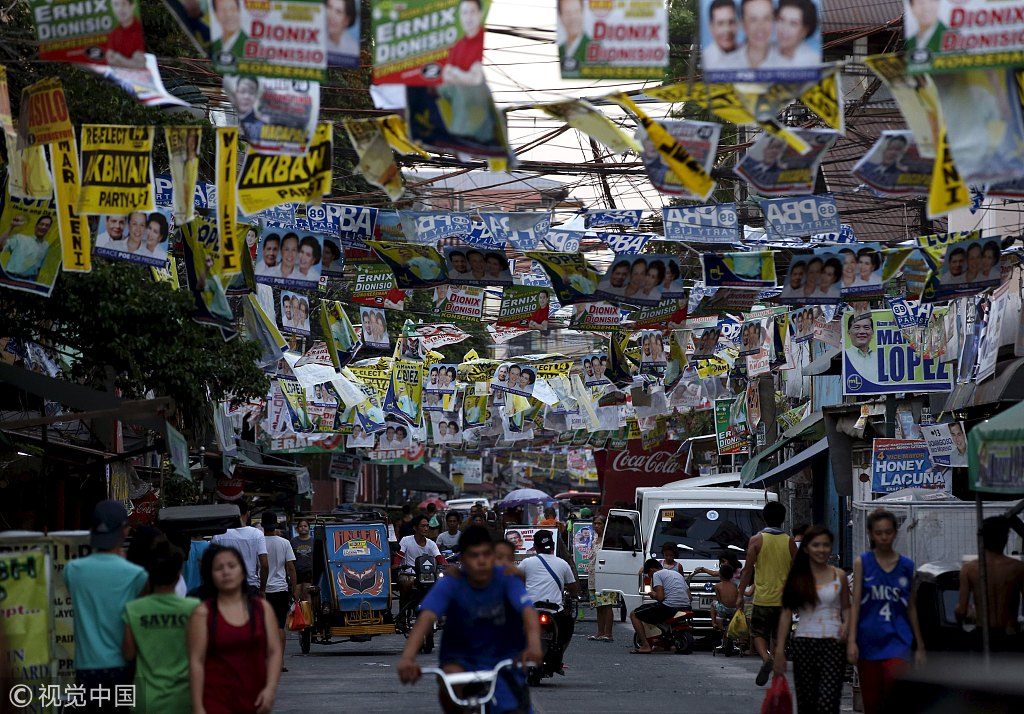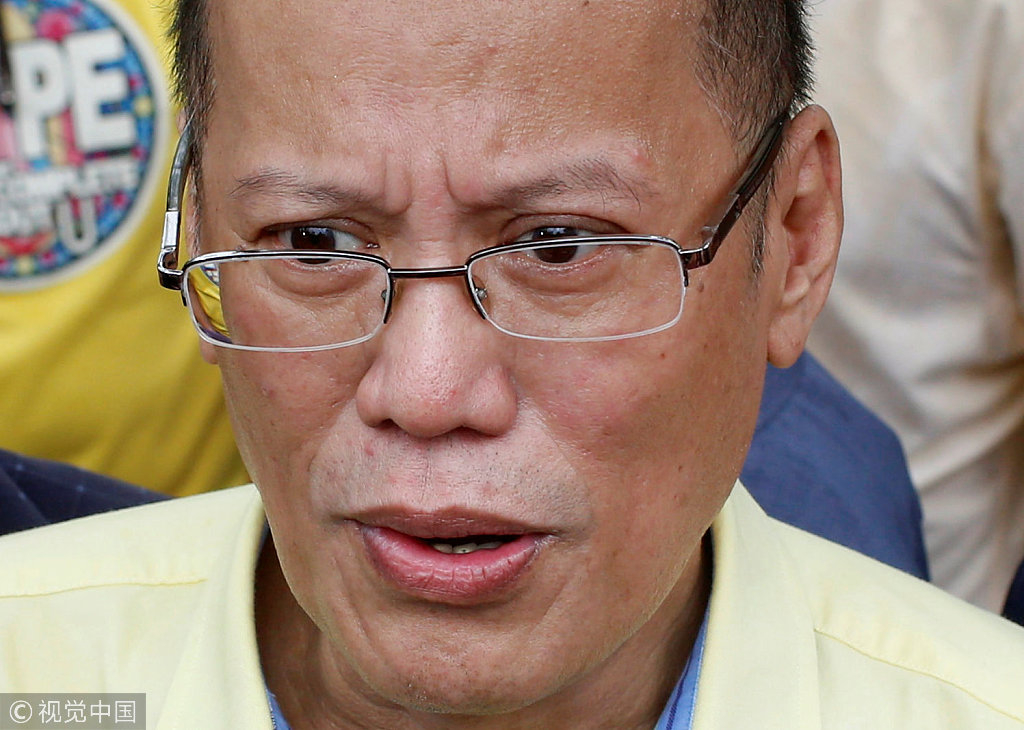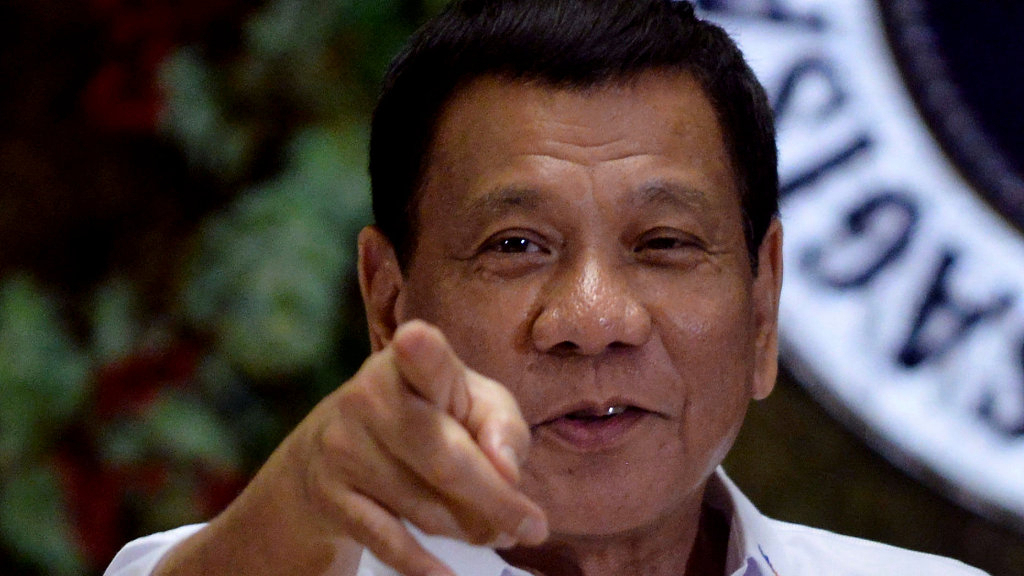It's the Filipino youth that will determine whether President Rodrigo Duterte will be backed by the Senate – if they show up in the polls on May 13. Those born after 1980 account for the majority of the registered electorate. Here is what you need to know about the 2019 Philippine elections.
Why the May 13 polls matter
Over 17,000 positions are at stake, from local legislators to 12 members of the Senate and 297 members of the House of Representatives. President Duterte, elected in 2016, does not face election himself.
Zhang Xuegang, deputy director for Southeast and Oceania studies at the China Institutes of Contemporary International Relations, told CGTN Digital that the elections are seen as a public opinion poll on Duterte's performance in office, as well as affecting the composition of the House and Senate. "It will impact Duterte's presidency for the rest of his term," he said.
Duterte polarizes with his harsh rhetoric and crass politics, such as the "War on Drugs" which has reportedly caused over 5,000 deaths. At the same time, he enjoys deep trust in the population, with 80 percent approving of his performance, a
Pulse Asia survey in December 2018 showed. His opponents are battling a fierce campaign to win the votes of the millennials, the dominant voter demographic. If the candidates for Duterte's ruling Philippine Democratic Party – Power of the Nation (PDP-Laban) and its allies in the Senate are to win more of the seats, it translates to more backing of Duterte's constitutional reforms and policymaking, such as his planned push for more federalism.

Election posters for May 2016 national elections hang above a busy road in Tondo, Manila, April 26, 2016. /VCG Photo
Election posters for May 2016 national elections hang above a busy road in Tondo, Manila, April 26, 2016. /VCG Photo
The all-important youth vote
Based on data by the organization who runs the elections in the Philippines, the
Commission on Elections (Comelec), Millennials and Generation Z voters (born after the year 1980) constitute a little over half of the registered voters. This means that almost 23 million voters are aged 25-39, with over 10 million aged 18-24.
"Young voters have a big impact on the country's midterm elections because the Philippines is a young country with more than 100 million people, about half of them under the age of 23.7, according to 2017 figures," Zhang said.
In an interview with the
Manila Times, Comelec spokesperson James Jimenez said approximately 61 million are expected to vote in the mid-term elections 2019. “This is because those who registered for the (2018) Youth Council polls do not need to register again.”
The 2018 village and Youth Council poll have led to an increase in voter registrations of people aged below 39, up from 30.5 million in 2016 to 33 million in 2019, Comelec's data shows. Comelec's data, therefore, indicates that the younger generation's opinions may determine the results of the midterm elections if they actually go to the polling stations.
Are millennials siding with Duterte?
The young voters' likes and dislikes about Duterte's policies can influence how the opposition parties compare in the two houses of parliament, Zhang said. The young voters' preference being hard to generalize, they do prefer charismatic leaders more than the older generations, value economic development and jobs, and are concerned about personal rights and the nation's maritime interests, he added.
Zhang said, in the campaign ahead of the election, the ruling party has emphasized Duterte's charm, the achievements of his administration in the past three years, including his engagement for overseas Filipino workers, and his encouragement to them to return home to seek employment.
According to an exit poll post-presidential elections in 2016, Duterte, the oldest President who ever assumed office at 71, got more votes from millennials. The "Trump from the East" seemingly appealed to younger voters, in particular, an opinion piece in the
Philippine Daily Inquirer cited the survey. With his "direct" and "honest" approach, younger, lower-income and middle-class voters see Duterte as an alternative to the political elites in the country, the Pulse Asia survey showed.
However, millennials will not uniformly vote for Duterte-backed candidates. All candidates will have a share in this age group, and the youth vote is not solid, Ramon Casiple, executive director of the Philippine Institute for Political and Electoral Reforms, told the Manila-based Business World Online in an interview regarding the 2016 presidential elections.

Nude members of a university fraternity protest against the government's "War on Drugs" campaign and crackdown on activists, at University of the Philippines, Manila, December 1, 2017. /VCG Photo
Nude members of a university fraternity protest against the government's "War on Drugs" campaign and crackdown on activists, at University of the Philippines, Manila, December 1, 2017. /VCG Photo
How are Duterte's opponents wooing the young?
Opposition parties, such as the Liberal Party have repeatedly denounced the government's anti-drug campaign as a human rights violation and frequently criticized Duterte's South China sea policy, Zhang said. In the unlawful killing of teenagers during the anti-drug campaign, the police were implicated, so the president had to put the Drug Enforcement Agency in charge of the operation, he added.
"Former President Benigno Aquino, a leading opposition figure, used it as a gimmick, appealing to young voters and their parents to support the opposition, especially in the Senate."

Former President Benigno Aquino III. /VCG Photo
Former President Benigno Aquino III. /VCG Photo
To rally support ahead of the elections, opposition parties have also used the rising concerns of rising public debt due to Duterte's administration's focus on gaining foreign investment for its infrastructure program. Duterte's efforts for better ties with the Philippines' largest trading partner China in that regard have been fruitful economically. In November 2018, China and the Philippines
signed memorandums of understanding on Belt and Road construction and a great number of other agreements during Chinese President Xi Jinping's visit to the country.
Since 2016, an estimated
200,000 Chinese nationals have immigrated to the Philippines, which caused public fears over remaining jobs for domestic workers. Duterte's opponents are now calling for more transparency over the conditions for Chinese loans and more employment for Filipino nationals.
Game-changer social media
The candidates swing the votes in their favor through several mechanisms including vote-buying, making use of the party machinery, highlighting their track record, but also a strong social media presence as part of their campaign. Comelec has come up with social media rules for the first time for the 2019 election period. Why?
Filipinos and Filipinas are the world's heaviest users of social media with 76 million users, 75 million of whom are on Facebook, according to We Are Social and Hootsuite's annual digital report, as cited by the Philippine news site
Rappler. Experts said that Duterte's win was also due to spending a lot on a social media campaign. To woo the electorate, especially the decisive youth vote, candidates have increased their social media presence even more ahead of the 2019 elections – but a lot of false information and hate speech also circulates online. In an interview with the
Philippine News Agency, Miko David, co-founder of the analytics firm David and Golyat, warned people to stay vigilant, as low-information voters could easily be swayed by possible misinformation online. "Truth be told, it (election campaign in social media) will provide a lot of platform for people to share their views, explain in detail what their (candidates) priorities are. But it also invites discussions, controversies," David said.

Supporters grab the hand of presidential candidate Grace Poe during election campaigning for May 2016 national elections in Tondo, Manila, April 26, 2016. /VCG Photo
Supporters grab the hand of presidential candidate Grace Poe during election campaigning for May 2016 national elections in Tondo, Manila, April 26, 2016. /VCG Photo
What could cause a lower youth turnout?
Political hostilities, unrest and violence often characterize the Philippine elections. Therefore, for the 2019 elections, the Philippines National Police rolled out a nationwide gun ban and announced
701 hotspots ahead of the polls, of which 94 are areas of grave concern, with a strong history of election-related incidents and increased political rivalry. The increased exposure to potential harassment while queuing in front of the ballots might cause some young voters to stay at home.
Also, the voting process is lengthy and tiresome. To be eligible to vote, Filipinos have to register months in advance, delivering documents such as their ID, birth certificate, student card or working contract. The lines both for registering and voting are long; people have to spend 45 minutes to several hours waiting.
Besides, a part of Filipino millennials doesn't feel represented by candidates who are mostly from established political families, with few newcomers. With social media, they still have an outlet for political expression.
Regardless of those limiting factors, voter turnout in the Philippines is among the highest, with 82 percent of those who registered actually voting in the 2016 elections, according to Comelec statistics.
(Cover: Philippine President Rodrigo Duterte points at photographers during an awards ceremony for outstanding government workers at the Malacanang Palace in Manila, December 19, 2016.)






